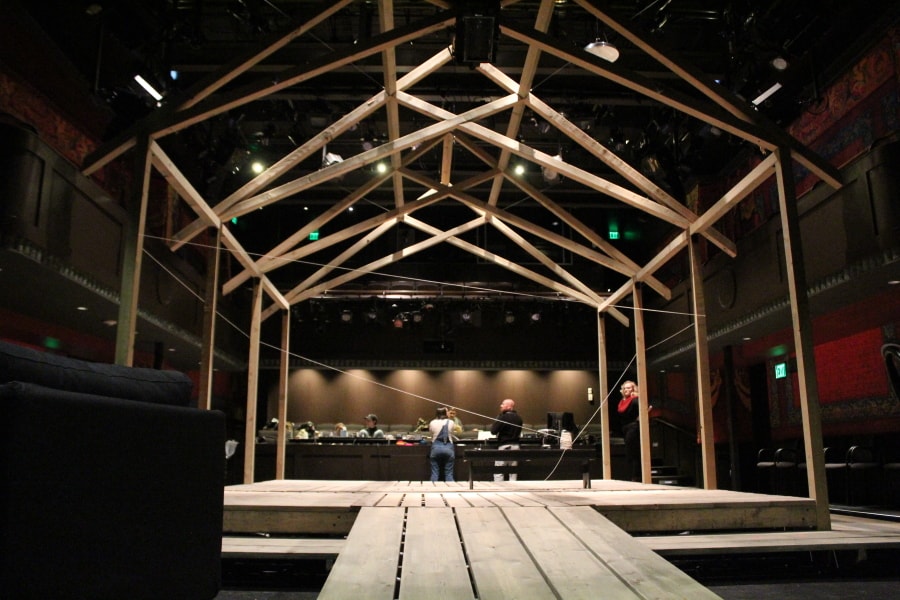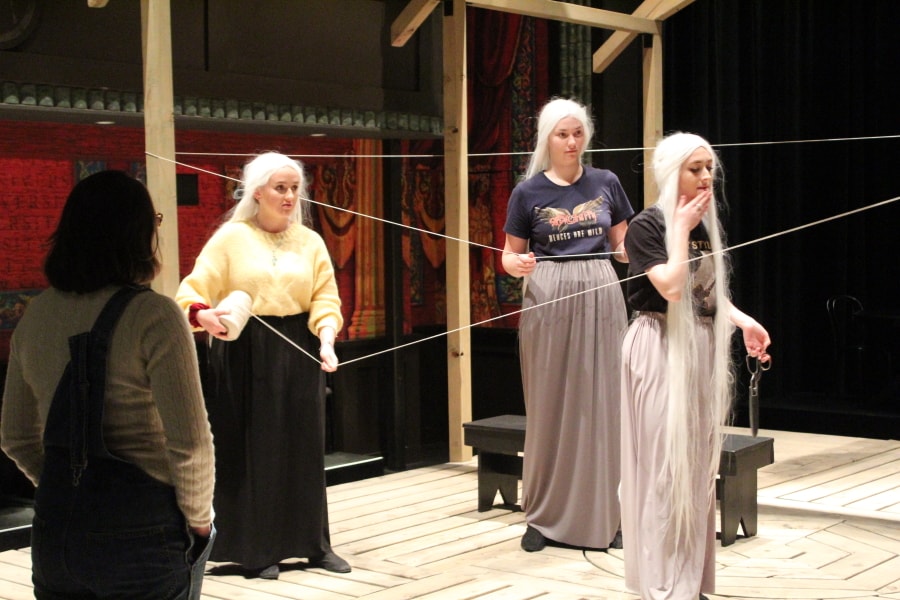Suffolk University in Boston is so excited to be presenting the world premiere of Thornton Wilder’s one-act series The Seven Deadly Sins in its entirety that the school might be committing one of the cardinal sins itself: pride. “We’re smugly proud,” says Wesley Savick, a professor at the school and the show’s director, with a laugh. “It’s thrilling!” The show runs at the university Nov. 21-24.
According to the Thornton Wilder Estate, Suffolk University’s production marks the first time the seven plays will be presented onstage in a single program. A representative of the estate will participate in a talkback about Wilder and The Seven Deadly Sins after the final performance.
Each of the one-act plays explores one of the capital vices outlined in Christian teachings, but the plays are more cautionary than preachy, Savick explains. “One of the things that is so intriguing is how dark they are, given the eternal optimism of Wilder,” says Savick. “The plays have a light touch but a dark tone.”
The plays include The Drunken Sisters (gluttony), Bernice (pride), The Wreck on the 5:25 (sloth), A Ringing of Doorbells (envy), In Shakespeare and the Bible (wrath), Someone From Assisi (lust), and Cement Hands (avarice). They range in content from tales inspired by Greek mythology to a story about a Florida con artist. And while each play represents a particular sin, the connection among the stories and their sinful inspirations is not always discernible, making it a puzzle for the audience.

Wilder wrote The Seven Deadly Sins in the late 1950s and early ’60s under the header “Plays for Bleecker Street.” They were intended to be staged in the round for New York City’s Circle in the Square Theatre. Someone From Assisi premiered there in 1961, and Suffolk University is honoring Wilder’s intent with its staging.
“We are using an exaggerated thrust stage and three-quarter staging,” explains Savick, noting that there are intimations of the Japanese Noh stage configuration known as hanamichi. The stage is a free-standing “wooden island” surrounded by audience on three sides, designed by Sara Brown, a scenic design professor at Massachusetts Institute of Technology.
“The balance is in honoring the specificity of each play while still linking them all together with a theatrical elegance that ties the whole evening together,” says Savick.
This isn’t the university’s first experience with Wilder. Each year the directing students tackle a one-act from the series The Angel That Troubled the Waters, a project that challenges students to be creative with its seemingly impossible stage directions and underwater scenes.
And after 9/11, Savick scrapped his initial plans for the fall production and staged Skin of Our Teeth instead. “It was a very useful play to navigate that moment for our students and to work through that feeling of threat and despair,” he recalls. In 2010, the program presented Wilder’s one-acts The Happy Journey to Trenton and Camden, Pullman Car Hiawatha and The Long Christmas Dinner as an evening.
The Seven Deadly Sins comes with its own set of challenges and lessons. For one, a few of the plays are unfinished. “What is interesting about these plays is that these were such a pet project of his, and he never got to really finish them to his satisfaction,” says Savick. Two of the plays were even taken out of rotation by Wilder. “If there are elements hanging out in irresolution, you have to ask yourself: Is this intentional or is this incompletion? That’s a challenge in working on these plays.”
Savick says it was logistically impossible to take on all seven plays himself, so he enlisted some help. Micaleen Rodgers, a current directing student, and Sydney Grant, a 2015 graduate of the program, are taking on three of the shows. That’s not a workload-saver, it also has the effect of “shaking up the directorial perspectives that are being brought to bear,” as Savick puts it.
Perhaps the biggest challenge has been wrangling the rehearsal schedule for a cast of 28 students. “It’s increasingly clear why professional productions of these plays haven’t happened yet,” he says with a laugh. While Savick suggests that it might be possible to double-cast, not doing so allows him to give as many students as possible the opportunity to perform.
“It’s always been my priority to try to defy the sort of star system that our theatre tends to support in its writing—that there are a few leads and few supporting actors, if any,” he says. “To play even a small role in an ensemble, in my experience, is profoundly meaningful for undergraduates studying theatre.”
In fact, Savick has never done a student production with less than 25 students in the cast. The record stands at 52. “The stage could barely contain them,” he recalls. For other educators looking for big-cast shows, he highly recommends The Seven Deadly Sins: “There’s meat on the bone for all of the actors.”
Besides offering an opportunity to perform and partake in a mainstage production, The Seven Deadly Sins present students with a lesson in morality. “The plays resonate with our times, given all of the ethical lapses we see in our leadership,” says Jim Kaufman, the program’s managing director. The natural tendency may be to do another take on Wilder’s Our Town, but the school was as attracted by the prospect of doing the world premiere of Wilder’s entire cycle as by the subject matter.
“As we navigate the age of Trump, and the kind of radical polarization that is going on in our country, in looking for scripts I’m looking for projects that reflect something that is of meaning and of immediacy to our students and the world we are living in,” says Savick. “There’s any number of ways to accomplish that, there’s even more ways to avoid it. What I saw was a windfall with the Wilder plays—the sins, as he’s talking about them, have to do with a reminder of morality as a force worthy of our attention.”
Suffolk University’s production of The Seven Deadly Sins, by Thornton Wilder. Direction by Wes Savick, Sydney Grant, and Micaleen Rodgers; scenic design by Sara Brown; assistant scenic design and props artisan, Justin Lahue (’21); costume design by Leslie Held; sound design by Samantha Noto (’20) ; assistant sound designer, Kendyl Trott (‘22); production stage manager, Blair Bogle (’20); lighting design by Steve McIntosh (also technical director and assistant production manager ) with Amanda Hackney (’19) and Sophia Lajoie (’20); production manager, Jim Bernhardt (also the department’s director of production); stage management supervisor, Heather Stern (also professor of practice); assistant stage managers, Julia Ditri (’23), Paige D’Ambrosio (’22), Hannah Jope (’20), Liv Joan (’21); graphic design by Matthew Ericksen (’15); department chair, Dr. Marilyn Plotkins; managing director, Jim Kaufman; and communications manager, Rosalind Beauchemin.


